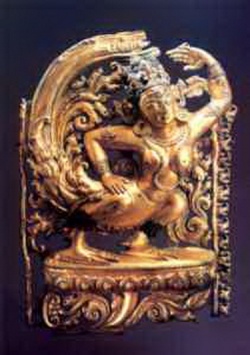Difference between revisions of "Four perfect knowledges"
Jump to navigation
Jump to search
| Line 30: | Line 30: | ||
{{RigpaWiki}} | {{RigpaWiki}} | ||
| − | [[Category:Knowledge]] | + | [[Category:Knowledge]]{{BuddhismbyNumber}} |
Revision as of 10:24, 22 April 2014
Four perfect knowledges (Skt. catuḥpratisaṃvid; Tib. སོ་སོར་ཡང་དག་པ་རིག་པ་བཞི་, Wyl. so so yang dag par rig pa bzhi):
- perfect knowledge of meaning (Skt. artha; Tib. དོན་སོ་སོར་ཡང་དག་རིག་པ་, Wyl. don so sor yang dag rig pa)
- perfect knowledge of Dharma (Tib. ཆོས་སོ་སོར་ཡང་དག་རིག་པ་, Wyl. chos so sor yang dag rig pa)
- perfect knowledge of language (Skt. nirukti; Tib.ངེས་ཚིག་སོ་སོར་ཡང་དག་རིག་པ་, Wyl nges tshig so sor yang dag rig pa)
- perfect knowledge of courageous eloquence (Skt. pratibhāna; Tib. སྤོབས་པ་སོ་སོར་ཡང་དག་རིག་པ་, Wyl. spobs pa so sor yang dag rig pa)
The four perfect knowledges are included within the twenty-one sets of immaculate qualities.
In Mipham Rinpoche's Khenjuk, these are described as the means of maintaining the vast and profound teachings, i.e., the ten topics of knowledge (the vast) and the four seals (the profound).
In the Abhidharma tradition, they are part of the exclusive qualities of a buddha.
Alternative Translations
- Four analytic insights (Andy Rotman)
- Four analytical knowledges (Edward Conze)
- Four specific perfect understandings[1]
- Specific perfect understanding of dharma
- Specific perfect understanding of meaning
- Specific perfect understanding of definitive words
- Specific perfect understanding of confidence
Footnotes
- ↑ Tibetan-English Dictionary of Buddhist Terminology, Tsepak Rigdzin, Library of Tibetan Works and Archives.
